Bart & Fleming: On…What Else? Sony Hack Attack
Peter Bart and Mike Fleming Jr. worked together for two decades at Daily Variety. In this weekly column, two old friends get together and grind their axes, mostly on the movie business.
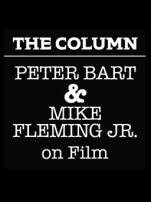
BART
: Here’s one lesson to be learned from the Sony scandal – one that should be taken to heart by George Clooney and other artists who are expressing outrage: The multinational corporations that control worldwide entertainment are too vulnerable and too vast to be counted on as defenders of free expression. Movies don’t spring from studios as in olden times; they are manufactured by corporate bureaucracies that are dependent on overseas audiences and alliances. Forget about North Korea; how about the corporate relationships with China and Russia? Are we really going to see films that honestly reflect the life of the typical Chinese? Or Russian? Or Israeli? The Sonys and Foxes and even Disneys of the world are not interested in ground-breaking entertainment – they’re worried about their global brands and theme parks.
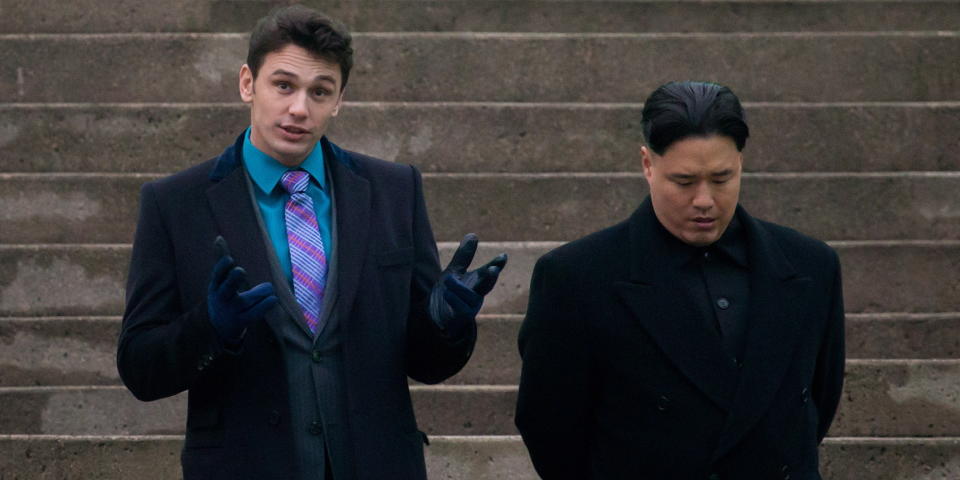
FLEMING
: A column like this works best if you start with something I can disagree with. We start off simpatico. The needy courtship of China already made Hollywood studios seem weak, as everybody knows that if you don’t meet the checklist requirements of a communist government with no free speech, your movies will be excluded. So we were already headed for tent poles with superheroes and aliens and dinosaurs, villains nobody can get mad at. Knowing what we do now, it’s appalling that MPAA sat by idly while one of its signatories got cyber attacked by a foreign country; that Sony was left alone to kill a film and then got chastised by President Obama, whose administration did little; and that Sony tried a face-saving measure to blame theater owners because the beaten-up moviemaker didn’t have the spine left to kill The Interview. It was easy to see through that, and NATO members are rightly furious at the studio. The point is, it’s clear MPAA and its members are too busy worrying about all the things you’ve cited to recognize an attack on free speech in film; can you imagine Jack Valenti going mime on this?
BART: Filmmaking will flourish in an atmosphere of free expression only if a new economic model emerges that is built on autonomous entities managed by people dedicated not to theme parks or cruise ships, but to (I shudder at the word) art. OK, also business. But under the present structure, the Sony scandal will surely be replicated in one form or another – a film being cancelled, a script cleansed, an ending changed. That will be the Sony legacy.
FLEMING: Are you reading my mind? Get out of my head!
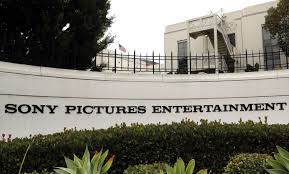
BART
: And yet another final question spurred by the Sony trauma: Will this incident help restore the time-honored methods of personal communication, and minimize the pathological dependency on the email? Remember the time when important information was conveyed in personal meetings? Or in hand-written notes? Or even phone calls? All of us have become dependent on the damned email as the only means of conveying good news or bad – and of avoiding meaningful confrontation.
FLEMING: We are clearly moving too fast in the digital age, the way we communicate and how vulnerable we are to the bad guys; all the terrible things that happened exposed us as children behind the wheel of a race car. It is so easy to feel in control, until you hit a wet patch and the skid starts. We were led to believe email was a safe, efficient form of private communication. Hot items for Christmas: telephones and typewriters.
BART: I’ve been guilty myself of ducking direct meetings. Its too easy to send an email saying “we pass.” People are even avoiding RSVPs to parties or dinner parties – apparently it’s easier simply to do a no-show.
FLEMING: Maybe this will deal a blow to passive-aggressiveness, which I loathe. Now, you’ll have to tell people how you really feel about them, face to face, or voice to voice. It will slow us all down. Is that the worst thing?
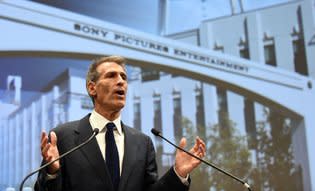
BART
: Even more egregious, all over town companies are firing long-standing employees via email or (even worse) stilted human resources meetings. Bosses don’t sit down with employees and say, ‘I hate to see you go, I will help you find something, I know you have a mortgage and a kid in college.’ Again, these meetings can be discomfiting. They’re also guilt-inducing – the bosses often know that the dismissals are often unjustified, that their companies are running up strong profits and are laying off staff simply to appease the numbers crunchers. It’s much easier to put the soldiers from human resources on the case and then fire off an email saying, ‘Sorry to see you go.’
FLEMING: This episode won’t eradicate that. Studios will always employ people to wield the hatchet. Maybe now, more of it gets done face to face.
BART: On the other hand, I’ve candidly enjoyed reading some of the Sony emails as they’ve rattled around the social media. The expressions of outrage and indignation were often vividly expressed. In my past meetings with Amy Pascal, for example, she was always diplomatic and cautious in her wording. I’m glad for her emotional health that she let loose and expressed her true feelings in her emails. But her emails! Really?! How about a lunch meeting, Amy, if you feel that strongly about something?

FLEMING
: After the indignity of apologizing to that phony Al Sharpton, Pascal is going to have to come back from this break realizing she won’t win a popularity contest and that she doesn’t have to, to survive. You wonder, was there an alternative to an apology tour? I might have said to any offended party: ‘Sure, I’m sorry, but let me review all the emails in your inbox, going back two years or so, and see if there is anything you might regret if made public.’ I checked with reps of almost all the people maligned in those emails. I couldn’t find one who has sworn off Pascal or Sony, the studio that had the stones to make Zero Dark Thirty and The Social Network, without authorization. The Interview was in hindsight a questionable call, and Pascal wanted too much to be in business with the hot makers of The Neighbors to dig heels in on fictionalizing Kim Jong-un. But greenlighting that movie was gutsy. Let’s say you wanted to make a valuable film about an active drug cartel. The bad guys now have a playbook to disrupt free speech. You only hope that Sony doesn’t lose its nerve, because I am not sure any of the other studios would have the guts to do some of the movies Pascal and Michael Lynton have made.
BART: There are a few incidental ironies about the Sony imbroglio that I find amusing, if not bewildering. At the center of it all we find President Obama criticizing the decisions of Lynton, who is arguably Obama’s biggest supporter in Hollywood. We find George Clooney also blasting Lynton for not defending free expression, yet Lynton came out of book publishing where he was a champion of free expression. And Clooney himself is about to start a movie at Sony about hacking – in this case the flagrant phone hacking perpetrated by Rupert Murdoch’s London-based newspapers (does Sony’s corporate parent look forward to taking on Murdoch?) Finally, at the center of what has become an intensely political controversy, we find Seth Rogen and Evan Goldberg, who once described themselves on my TV show as “two Jewish nerds from Canada.” I’m not sure either of these guys have ever voted. Their success in the business still surprises their friends. “As kids they couldn’t even score a date, forget about a start date,” one Canadian friend reflected. Well, they got their start date with The Interview. Alas, also their stop date.
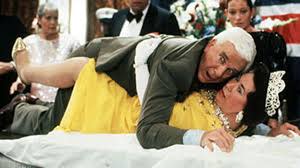
FLEMING
: Rogen, an unrepentant smoker of weed, seemed unlikely to be at the center of an international incident. It’s like he just lived a Cheech and Chong movie. Not many people come out of this looking good, but Clooney sure does. He’s someone to be admired. I saw this in him the first time, back at Variety, when he and his E.R. castmates swore off any more covers of TV Guide, then a hugely powerful magazine. That was because the sole original core cast member, Eriq La Salle, kept getting excluded. Clooney was upset that editors weren’t being honest that his skin color was the reason; instead, the mag would set a photo shoot, postpone it and put as many other white stars on the cover as would hold still for a photo. I had a friend who ran that magazine, and I took no pleasure in breaking that story but it was important. I saw it again later when the very intense David O. Russell berated an underling on the Three Kings set and Clooney got right in his face when the director wouldn’t stop, and they took the fast lane to Fist City. And then again when hedge fund magnate and then minority Sony shareholder Daniel Loeb berated Pascal for a bad 2013 summer, with Clooney reminding Loeb he had no right judging her when he knew nothing about the ebbs and flows of studio slates. He made that movie about Edward R. Murrow standing up to McCarthyism, and it’s clear Murrow has imprinted on Clooney and that is why no way he backs off Hack Attack. That is an important film, a reminder of what happens to media when it gets caught up in the pressures of the 24-hour news cycle and competition and forgets things like empathy. Many feel media did that during the Sony attack and that feasting on the low-hanging fruit of widely disseminated stolen emails gave the hackers the needed credibility when they finally threatened to blow up theaters if The Interview wasn’t canceled, as a cover letter to Lynton’s emails.
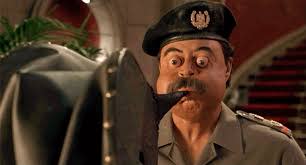
Besides, the Brits exhibit a stiff upper lip when it’s their turn to be lampooned or to wear the black hat in movies from Braveheart to The Patriot, and in the silly comedy category that The Interview belongs in. I recall seeing the Queen’s knickers in those Leslie Nielsen Naked Gun movies, and no war was declared; come to think of it, not every despot is so camera shy as I recall watching Saddam Hussein get killed in two Hot Shots films, the mad man taking it in stride. Surely, Rupert Murdoch and some randy tabloid reporters can withstand a much deserved cinematic Rodgering, no?
Related stories
Candy Crowley Saluted By Colleagues, Competition, Late-Night Hosts And Robot - Video
Attention, Hacked And Beleaguered Sony Staffers: Self-Protection Tips
Hollywood Needs Cyber Czar: Guest Column
Get more from Deadline.com: Follow us on Twitter, Facebook, Newsletter

